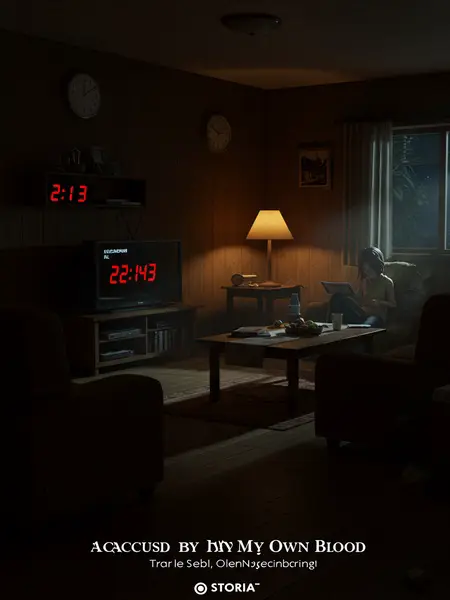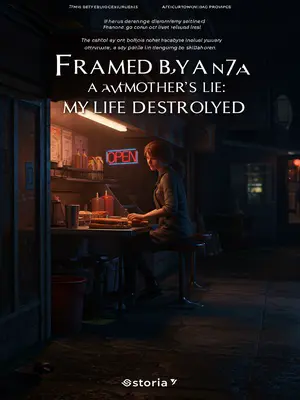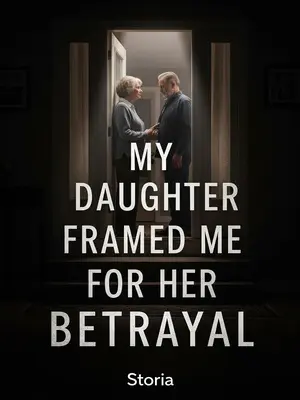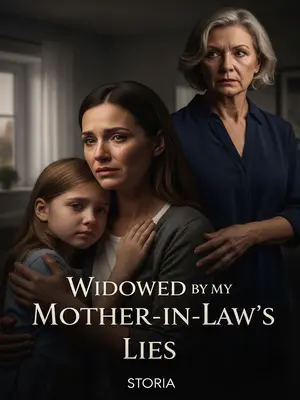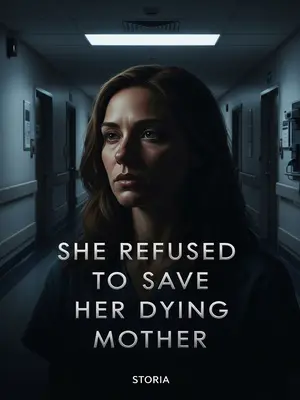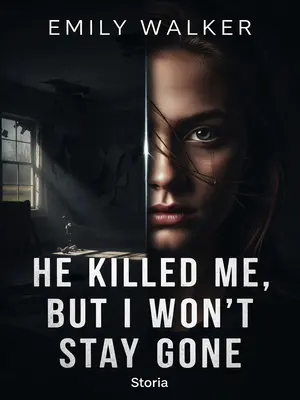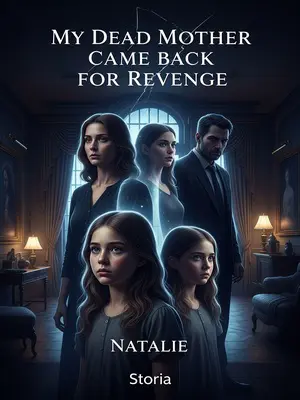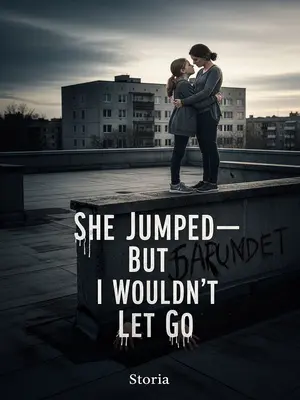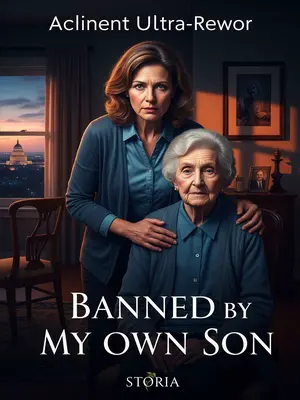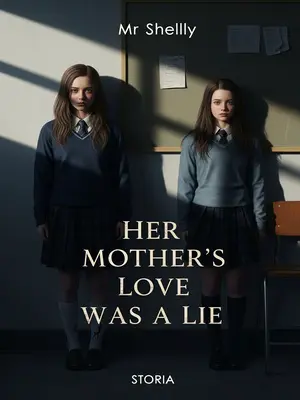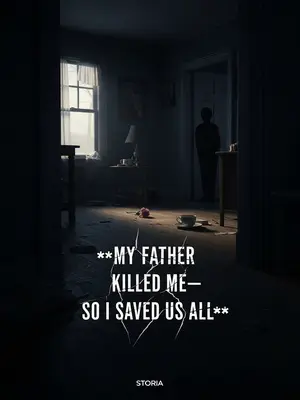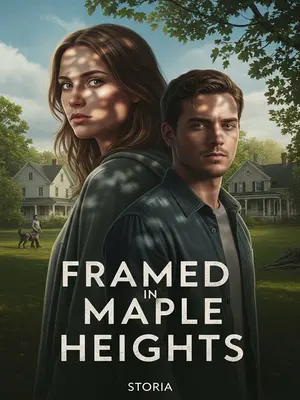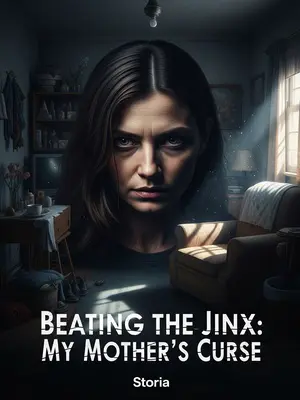Chapter 1: Accusations at the Memorial
Halfway through my mom’s memorial at Maple Heights Cemetery, my younger cousin tore up the hillside, his sneakers slipping on brittle spring grass and leaving streaks of mud behind. The cold wind cut through my jacket, biting at my skin as I hunched over in the back row, knees damp from the grass, picking at sunflower seeds I’d hidden in my pocket—a nervous habit since I was a kid riding shotgun on endless family road trips. The air was thick with the scent of smoke from the memorial candles, damp earth, and a trace of old perfume, all mixing beneath a sky so heavy with clouds I half-expected it to crack open and pour.
I kept to myself, crunching seeds, half-listening to the droning prayers. In my head, I thought, “Someone died on Easter Sunday—what a cursed morning.” The shells scraped my tongue, the taste suddenly bitter as my cousin’s panicked voice split the air, loud enough to startle even the mourners at the edge of the crowd.
He pointed straight at me, finger trembling so hard I thought he might drop it. “My sister ran over Mrs. Wilson with her car!” he yelled, the words echoing off marble headstones and fresh dirt, too surreal to process, like a scene out of a bad high school play.
All at once, the whole crowd turned. Old neighbors, distant relatives, even a couple of kids clutching sticky plastic Easter baskets—they all stared at me. The morning’s sense of unity shattered, replaced by a buzz of whispering and side-eye. I felt my neck burn with shame and dread as I caught the first of many accusing looks. In that moment, I flashed back to being eight, blamed for breaking Grandma’s lamp—everyone always so quick to believe the worst about me. The fear of small-town gossip twisted my stomach, cold and familiar.
I just sat there, stunned. My ears rang, the taste of sunflower seeds turning metallic. Was this some awful joke? But the way everyone looked at me—like I’d just pulled a gun—left no doubt. Their grief was gone, replaced by suspicion and something almost gleeful.
My cousin’s voice grew steadier, like he was feeding off the crowd’s attention. “She was speeding at nine this morning and hit Mrs. Wilson, right outside Wilson’s Market.” Every word landed heavy, the tension spreading like ripples in a muddy pond.
Nine a.m.
We’d climbed the hill before dawn, five a.m., to honor our dead. I’d knelt for hours beside my uncle’s wheelchair, breathing in the thick smoke of burnt offerings. The cemetery felt packed, the living pressed close to the graves, elbows brushing cold granite, everyone shivering in the early chill. Damp grass clung to my jeans and the wind kept snaking down my collar, making it impossible to feel warm or safe.
“Natalie, you gotta come clean. Don’t make this worse.” My cousin’s voice cracked as he tried to sound grown up, but the quiver gave him away. A shiver ran down my back, part wind, part the sick realization that in Maple Heights, a rumor could grow teeth faster than wildfire.
Sarah, my sister-in-law, clutched her purse so tight her knuckles went white. “Natalie, how could you be so reckless?” Her voice was sharp, disappointment cutting deeper than anger, like I’d spilled coffee on her favorite dress instead of being accused of killing someone.
My cousin glared at me. “I told you before—so many people out on Easter. You have to watch it when you’re driving.” His face scrunched, brows pinched together, like he’d practiced this speech in the mirror just waiting for a moment to use it. A few heads in the crowd nodded, feeding off the drama.
My aunt dabbed her eyes with a crumpled tissue, her voice trembling. “Natalie, you need to do the right thing. Make it right before it gets any worse.” Her words dropped like a stone, heavy with all the things she’d never said to my face.
My voice came out tight. “Little brother, when you say ‘sister’—you mean me?” My eyes begged him to take it back, to say he was confused or just scared.
He crossed his arms and jutted his chin, stubborn as ever. “Of course it’s you! I saw it. A lot of people did. You were driving.” He looked so sure—like a tattletale who finally had the world on his side.
“I was on the hill all morning—right here, kneeling, lighting candles, crying. I even tried to wake you up, but you wouldn’t get up.” My words bounced off the crowd, but I could see the doubt growing on their faces, thicker than the fog rolling in over the graves.
My cousin’s face flushed red. “Stop making excuses. Just admit it. Mrs. Wilson’s family is on their way up here right now.” His threat hung over the crowd, as if the Wilsons were about to march up with torches and pitchforks.
I turned to my uncle, desperate. “Uncle Jeff, I was by your side the whole time. You would’ve seen me leave, right?” I tried to steady my voice, clinging to hope he’d back me up.
Uncle Jeff, always in his wheelchair, had me push him up the muddy path. His wheels left faint tracks in the grass. “There were a lot of people, Natalie. How could I keep track of everyone?” His voice wavered. “If you made a mistake, just admit it. The Parkers don’t run from trouble.” He wouldn’t meet my eyes, fiddling with the brake lever like he could find the answer there.
“But—” My protest was cut short by the weight of every gaze. The crowd had shifted in an instant from mourners to jury, their eyes cold and hard.
Especially my cousin, standing tall and righteous, like he’d waited his whole life to be the hero—or the one to throw the first stone.
Confusion swirled inside me. Why hadn’t my cousin gotten up on memorial day of all days? The thought itched at the back of my mind, but there was no time to dwell on it.
I squeezed through the crowd and found Uncle Derek. “Did you hear what your son just said?” I asked, breathless, careful not to step on the lilies laid out for the dead.
Uncle Derek, the family’s golden boy, wore a crisp flannel and rolled sleeves, every inch the proud local farmer and online entrepreneur. He married the mayor’s daughter, my younger aunt, and always seemed untouchable—until now.
“Natalie, everyone slips up. Don’t be afraid. Own what you need to and we’ll help you.” He spoke like he was haggling over tomatoes at the farmer’s market, not talking about someone’s life.
“But I was here all morning! What am I supposed to confess to?” My words bounced off him. The crowd closed in, the air thick with judgment.
“I saw on the news that if you hit someone and get the family’s forgiveness, you might not have to go to jail. The Wilsons are good people—they won’t make trouble. Don’t worry too much.” His voice had that talk-show-host calm, as if this was just another family mess to sweep under the rug.
My cousin’s voice cracked again, “Natalie, go turn yourself in before it’s too late!” The ripple of fear spread through the group like a stone tossed in still water.
A sharp gust whipped through the cemetery, scattering ashes and chilling me to the bone. My jacket felt paper-thin, and I wished for the old quilted vest Mom used to nag me to wear. The cold felt personal, crawling under my skin.
“It’s over. The Wilsons are coming. You really screwed up.” My cousin’s words landed like a final blow, the whole world tilting beneath my feet.
A dozen people surged up the hill, making the little cemetery even tighter. I recognized the mailman, neighbors, parents of kids I’d gone to school with—all of them with faces twisted in shock and grief. The sound of boots crunching gravel mixed with the low coo of a mourning dove, fitting and haunting.
Leading the pack was Mark Wilson, Mrs. Wilson’s oldest son, flanked by relatives in black, their faces red and wet with tears. Their sobs were sharp, slicing through the cold air.
“Who’s Natalie Parker?” Mark demanded. The crowd parted like the Red Sea, every head turning my way, pinning me in place.
Even the littlest kids stopped squirming, craning their necks to get a look at the accused. The weight of their stares pressed down, harder than any punishment I’d ever known.
I had no choice but to step forward. My shoes crunched on the gravel, every step feeling like a walk to the gallows. “That’s me,” I said, voice trembling but determined.
“You ran over my mom this morning. What do you have to say for yourself?” Mark’s eyes were wild, rimmed red, pain and accusation all mixed together.
“Mark, you must be wrong. I’ve been here since five this morning, at the memorial. I never left—how could I have driven and hit your mom?” My words sounded weak, nearly swallowed by the wind and the crowd’s skepticism.
Mark’s jaw clenched. “Natalie, we grew up together. I never thought you’d do something like this. You went off to college and came back changed, like you don’t care about anyone here.” The accusation hit hard, dredging up every old slight and every whispered rumor about me never quite fitting in.
“Mark, you can’t just accuse me with no proof.” I straightened my shoulders, desperate to hold onto my dignity. The Parkers might be a mess, but I wasn’t about to take the fall for something I didn’t do.
“Let me ask you, is the white Audi with plate 97336 yours?” Mark’s voice was sharp, slicing through the confusion that gripped the crowd.
My mind blanked. “Yeah. I drove it home yesterday and parked it in front of my house.” I pictured it now, streaked with mud from last night’s storm, sitting right where I’d left it.
“Good. Come look at this.” Mark pulled out his phone and cued up a surveillance video from outside the market.
The timestamp read 9:03 a.m. Mrs. Wilson stepped out, arms full of cardboard. A white Audi sped by and hit her. The footage was shaky but clear—my car, my plate, the blue-eyed plush rabbit from my rearview mirror bobbing in the frame.
Mrs. Wilson was thrown, landing hard. The horror on that tiny screen made my stomach twist. Blood spattered the pavement, and the crowd’s sharp intake of breath filled the air.
The Audi reversed, paused at the door, then sped off. No one got out. No window rolled down. The question hung there—why didn’t the driver stop?
The license plate was clear as day, and the rabbit doll—an old college joke—was now evidence. My stomach churned. That little blue-eyed rabbit felt like a noose around my neck.
“Not only did you hit my mom, you ran. That’s a felony. Still won’t admit it?” Mark’s voice was raw, grief turning to fury.
Panic crept up my spine. The cemetery felt smaller, the air thinner, as if the whole town was pressing in to judge me.
It was my car, but I wasn’t behind the wheel. My mind raced, heart pounding like a marching band on Friday night. I tried to piece together the morning—who had my keys? Where had they gone?
Last night, after my shower, I left everything in my room. This morning, I woke early for the memorial and only brought sunflower seeds and my phone—no keys, no wallet. Who could have slipped into my room, taken my keys, and driven off?
I tried to steady myself. The truth would come out. It had to. I just had to hang on until it did.
